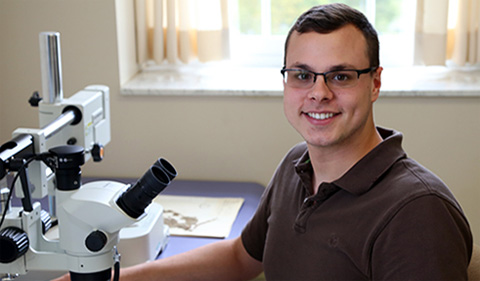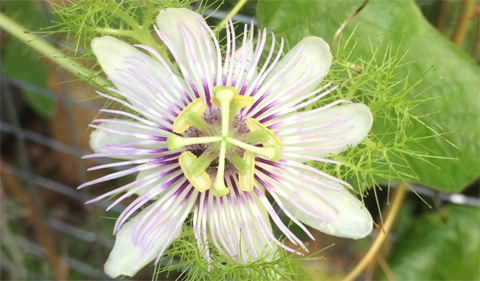By MC Tilton, PACE Writer
In search of preserved specimens of passionflowers, Harlan Svoboda traveled more than 15,000 miles last summer to herbaria in the United States and Mexico.
Now he’s back in the lab at Ohio University using DNA to create the first phylogenetic tree of a complex group of passionflowers.
Svoboda is a doctoral candidate in Environmental & Plant Biology.
With the help of an Ohio University Student Enhancement Award, he traveled more than 15,000 miles to five different herbaria in the United States and Mexico to view preserved specimens for his primary research on (genus Passiflora). Herbaria (collections of dried, pressed plant specimens) will ship loans to researchers, but Svoboda’s samples are so numerous that he set out to see them in person, exchanging ideas with curators and other researchers along the way. In addition to his herbarium travels, he also visited the country of Colombia as a presenter at the annual Passiflora Society International meeting.
“There’s no way that I could have done what I wanted to do with my research without the Student Enhancement Award grant,” Svoboda said. “It’s very competitive, and it can be difficult to translate four years of data, thinking, and enthusiasm into something on paper that excites the reader. But, it was a great exercise in figuring out my broader impacts – it’s my baby, my passion, and it was definitely worth it to share that with the reviewers.”
‘So Much More Than a Pretty Plant’
Svoboda’s fascination with plants’ integral part in upholding human life never stops.
“Our whole world revolves around plants,” Svoboda reflects. “It’s so much more than just a pretty plant in your garden. There are so many functional and medicinal purposes, and it’s so exciting to be able to discover them all.”
Svoboda, originally from Texas, attended Stephen F. Austin State University for his undergraduate degree in biology and moved to Athens in 2013 to work with Dr. Harvey Ballard, Professor of Environmental & Plant Biology, in plant systematics.
Svoboda calls systematics a foundational science at the base of any plant biology study.
“You’re losing so much information if you don’t actually know the species that you’re working with,” he says, “and have a name for it and know how it’s related to other plants – that’s systematics. I knew I wanted to be on the ‘ground floor’ of science.”
Creating a Family Tree for the Passionflowers
While half of Svoboda’s award funds went to travel, the other half is for the molecular portion of his systematic studies of Passiflora. He plans to use DNA from each of the 21 species (plus many more undescribed ones) in his study group to create a phylogenetic tree showing relationships of the species involved—a task that has never been done for this particular group before.
Svoboda became interested in Passiflora “based almost entirely on the ‘wow factor’” of the plant’s brilliant colors and completely unique flowers.
“When I saw one out in the field for the first time, I was blown away,” Svoboda said. “I’d never seen anything in my life like that before, so from that moment on, I said I’d work on that group even thought I didn’t know how, because these plants are so phenomenal.” He’s also impressed by the diversity of the genus, taking joy in identifying specimens and naming new finds.
Throughout his time at OHIO, Svoboda also had the opportunity to teach international field courses in the Bahamas and Panama. Numerous conferences, both domestic and international, have been another highlight of his graduate career, excitedly remembering that, “you get to interact with these brilliant scientists. You’ll be reading and basing your own studies off of someone else’s work—then you’ll meet them right there in person!”
Going forward, Svoboda’s dream job would be at places like the Smithsonian or the New York Botanical Garden, curating herbarium specimens and completing his own core systematics research. He also sees himself in an academic or professorial position. No matter the place, Svoboda knows he’ll be working hard to make a difference in passionflower research and the field of plant biology.





















Comments